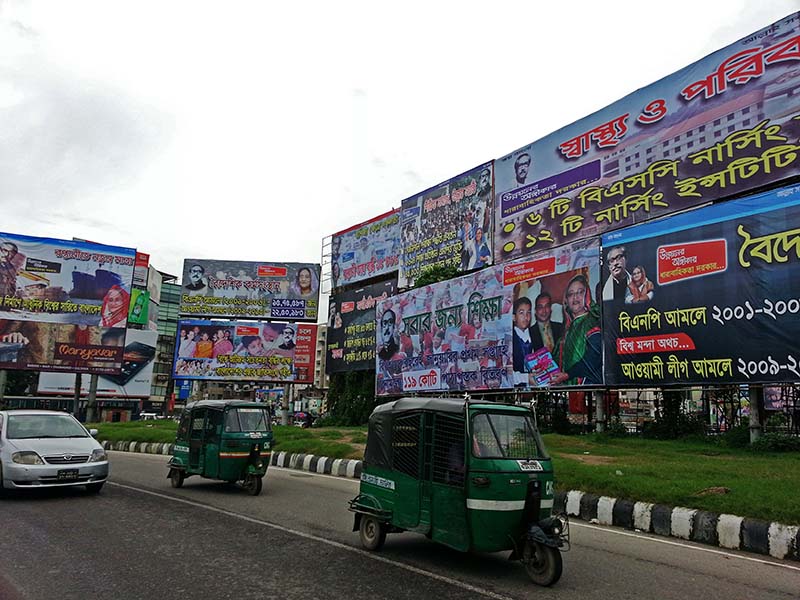by ?Taj Hashmi in The Daily Star

It is time to protest the ruling Awami League?s self-publicity through billboards at a staggering cost of more than Tk.3 crore (one senior minister would possibly say taxpayers? Tk.3 crore is ?rubbish? as he ?rubbished? the 4,000 crore stolen by Hall-Mark). I am really shocked and saddened by the government?s overwhelming ?billboard campaign? ? whose impact will be grossly under-whelming though ? and the deafening silence of our civil society, intellectuals, politicians and youths over this scandalous act of the ruling party. The removal of commercial billboards to the detriment of commercial firms by the government is also shockingly unwarranted.

What has been mis-described as the government?s right of self-defence is actually the ruling party?s blurring the line between the government and the ruling party. It happens only under totalitarian rule, not in democracies. This bizarre and undemocratic self-publicity at public cost is as bad as the government?s not-so-muffled pork-barrel policy that threatens opposition voters of minimal or no development projects (or longer load-shedding hours) in their constituencies.
Then again, this flagrant violation of democratic norms and principles by the ruling party is not unprecedented. Unrepresentative governments/regimes that realise the ice they are trampling on is quite thin, often do publicise their ?achievements? to buy the elusive mass support. The British rulers did this quite frequently to buy mass support in colonial India. They were quite successful in hegemonising mass consciousness for more than a century through development projects and publicity. Some achievements of the British Raj (even Karl Marx had kind words for those projects) were actually unprecedented, such as the telegraph, railways, electricity, and the rule of law.
The colonial British Government had its Publicity Department, which used the press and publicity officers to demonstrate government achievements and the ?benign? nature of the colonial rule. One may point out the magic lanterns, and later the cinema shows (silent and ?talkies?), of the 1920s through the 1940s in this regard. Sher-e-Bangla Fazlul Huq?s government of Undivided Bengal did publish a booklet with government money in 1940 or 1941 in self-publicity (of what his government had achieved) and there was bitter criticism from the opposition and some members of the ruling parties (Muslim League and the Krishak Proja Party) for blurring the line between government and the ruling party.
The Pakistan government also did publicise its achievements through the Publicity Department, which is a colonial hangover in some postcolonial countries. One may mention the short films the Pakistan Government Publicity Department used to show in movie theatres (viz. Chitre Pakistani Khabor during Ayub Khan?s rule). Ayub Khan also publicised his ?achievements? (?The Decade of Reforms, 1958-1968?) through billboards and media. He blurred /erased the line between the government and his ruling party. And He did not run a democracy. Most importantly, the over-blown publicity of his ?Decade of Reforms,? albeit with public money, precipitated his fall in less than five months following the ?Decade? in March 1969.
In view of this, one wonders, can the government really salvage its eroding popularity with billboards? One wonders if the ruling parties in India or Sri Lanka could get away with self-publicity with public money. One may ask the question: Can democracy really sustain in a society where people are so inert and indifferent to such violations of democratic principles?
It is time to protest. If this move goes unprotested then there is every likelihood that whichever party comes to power after the next elections would do the same and would probably spend even a bigger amount (taxpayers? money) in self-publicity and self-aggrandisement. Let good sense prevail and the government withdraw all the billboards! People across the board should come out of their ?bullet proof? partisan shells to condemn self-publicity with public money.
with public money.
The writer is at Austin Peay State University, Clarksville, Tennessee, US.




Leave a Reply
You must be logged in to post a comment.